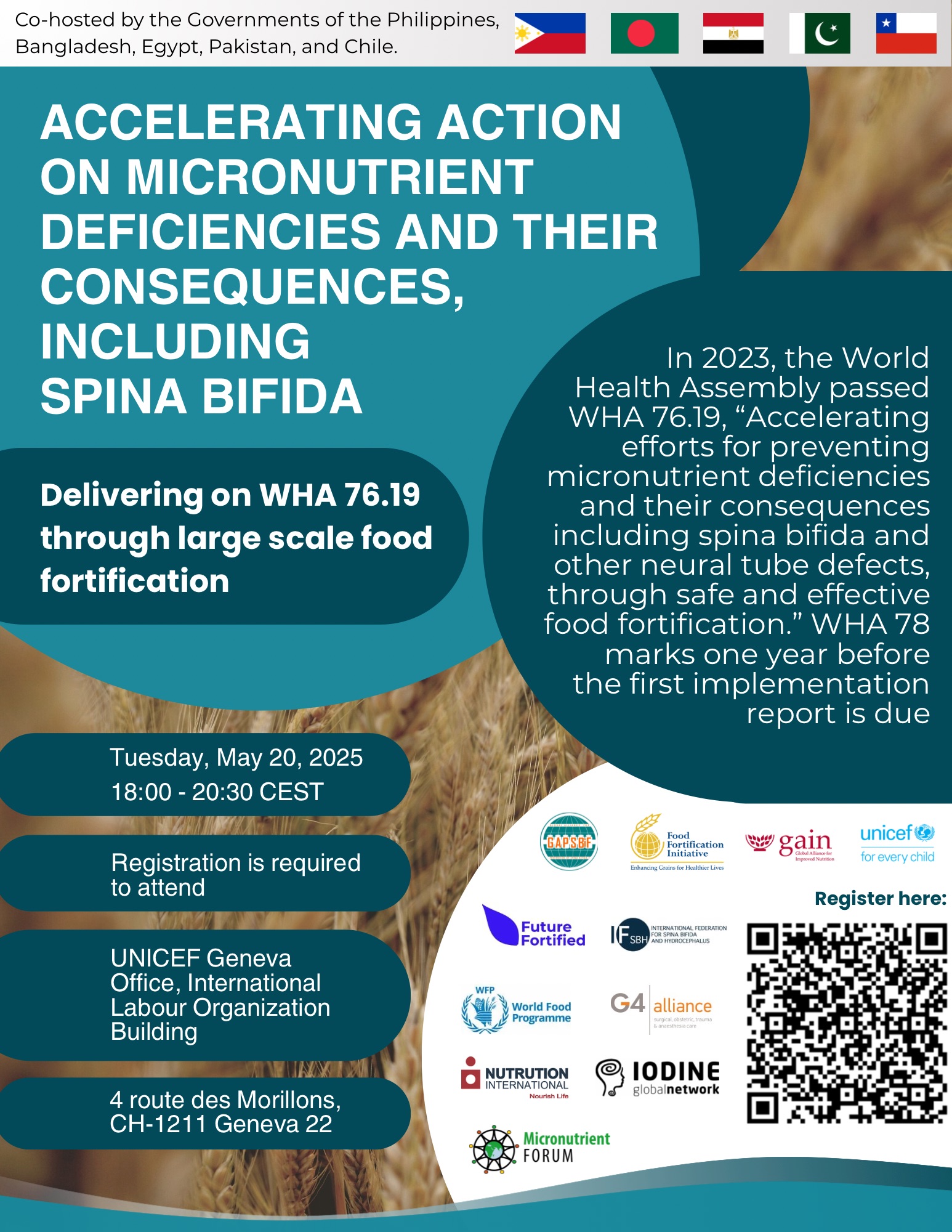
Dr. Azucena Milana-Dayanghirang, MCH, CESO III
Assistant Secretary, Department of Health, and Executive Director IV, National Nutrition Council, Republic of the Philippines
Mode: Hybrid
Venue: UNICEF Geneva Office or Virtual
Time:Tuesday, May 20th 2025, 6:00 – 8:30pm CET
The 78th World Health Assembly (WHA) will be held in Geneva, Switzerland from Monday, May 19, 2025 to Tuesday, May 27, 2025.
At GAIN, we believe nutrition is the foundation of health. As the world gathers for the 78th World Health Assembly, we remain committed to shaping policies that ensure better nutrition for all. As part of our WHA 78 engagement, GAIN is co-hosting a high-level side event focused on large-scale food fortification. This event marks two years since the adoption of WHA Resolution 76.19 (Accelerating efforts to prevent micronutrient deficiencies through safe and effective food fortification)
Accelerating Action on Micronutrient Deficiencies and their Consequences, including Spina Bifida: Delivering on WHA 76.19 through Large Scale Food Fortification
WHA 78 marks two years since passage of the World Health Assembly resolution 76.19 and one year before the first report on implementation is due.
This high-level side event kicks off a year-long drive to expedite implementation of the resolution at global, regional and national levels, featuring:
In March 2025, stakeholders gathered at the Nutrition for Growth Summit (N4G) in Paris, many of them registering new 4-year commitments to combat micronutrient malnutrition through large-scale food fortification. This side event will recognize and celebrate the milestones reached at N4G 2025 while pointing the way forward towards implementation of the WHA resolution.

This side event will feature a dynamic lineup of speakers representing a cross-section of global leadership, technical expertise, and lived experience.

Assistant Secretary, Department of Health, and Executive Director IV, National Nutrition Council, Republic of the Philippines

Paediatric Neurosurgeon, Professor, Researcher, and Global Health Advocate

Director of Programs at the Micronutrient Forum
![Yakob Seman Ahmed [MPH, MBA, PhD]](/sites/default/files/styles/thumb_cover/public/publications/4wha.png?itok=zhGghyzo)
Health Policy Expert

Senior Program Manager at the Micronutrient Forum

Senior Technical Specialist-Knowledge Leadership

Directorate General of Health Services Ministry of Health & Family Welfare

Director of the Nutrition Department at the Ministry of Health in the Sultanate, Oman

Secretary General of the International Federation for Spina Bifida and Hydrocephalu

President of the International Federation for Spina Bifida and Hydrocephalus

Clinical Research Manager of the Division of Pediatric Neurosurgery at the University of Alabama at Birmingham (UAB)

Senior Officer for nutrition advocacy and communications at the Gates Foundation
Stunting and overweight in children under five years of age remain major malnutrition challenges in the 12 countries in Africa and Asia where GAIN operates: Bangladesh, Benin, Ethiopia, India, Indonesia, Kenya, Mozambique, Nigeria, Pakistan, Rwanda, Tanzania, and Uganda. These forms of malnutrition appear in two of the six Global Nutrition Targets of the World Health Assembly (WHA), which are meant to be achieved by 2025. This paper evaluates progress towards these two WHA goals in these 12 countries, identifies lessons learned, and offers actionable insights for evidence-based policymaking.
While some countries have successfully reduced stunting and overweight, overall progress, particularly on stunting, remains slow. Using globally accepted methodologies, we find that of the 12 countries studied only Kenya is on track to meet the WHA stunting target by 2025, while the other 11 countries are classified as off track, having made some progress. For child overweight, nine countries, namely Ethiopia, Indonesia, Kenya, Mozambique, Nigeria, Pakistan, Rwanda, Tanzania, and Uganda are on track, while the remaining three are off track.
Through deep dives into selected cases, this paper emphasises the need for multi-sectoral approaches, strong political commitment, and targeted interventions. A shift towards integrated, data-driven, and context-specific solutions is crucial.
Accelerated, evidence-based action must be taken. This includes highlighting where efforts need to concentrate, guiding policy and programme adjustments, and enabling more targeted interventions to help countries achieve and surpass the reductions in child stunting and the limitations on the rates of child overweight embodied in the WHA 2025 nutrition targets.
At WHA 77, global leaders made significant commitments to strengthening food systems, advancing nutrition policies, and tackling food insecurity.
WHA76 Side Event - Accelerating efforts for preventing micronutrient deficiencies and their consequences through safe and effective food fortification